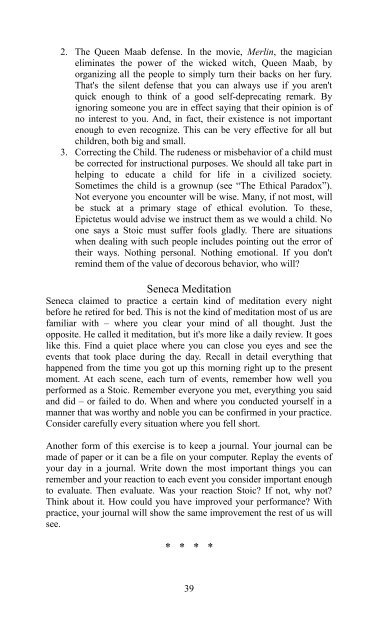The Stoic HANDBOOK - College of Stoic Philosophers
The Stoic HANDBOOK - College of Stoic Philosophers
The Stoic HANDBOOK - College of Stoic Philosophers
You also want an ePaper? Increase the reach of your titles
YUMPU automatically turns print PDFs into web optimized ePapers that Google loves.
2. <strong>The</strong> Queen Maab defense. In the movie, Merlin, the magician<br />
eliminates the power <strong>of</strong> the wicked witch, Queen Maab, by<br />
organizing all the people to simply turn their backs on her fury.<br />
That's the silent defense that you can always use if you aren't<br />
quick enough to think <strong>of</strong> a good self-deprecating remark. By<br />
ignoring someone you are in effect saying that their opinion is <strong>of</strong><br />
no interest to you. And, in fact, their existence is not important<br />
enough to even recognize. This can be very effective for all but<br />
children, both big and small.<br />
3. Correcting the Child. <strong>The</strong> rudeness or misbehavior <strong>of</strong> a child must<br />
be corrected for instructional purposes. We should all take part in<br />
helping to educate a child for life in a civilized society.<br />
Sometimes the child is a grownup (see “<strong>The</strong> Ethical Paradox”).<br />
Not everyone you encounter will be wise. Many, if not most, will<br />
be stuck at a primary stage <strong>of</strong> ethical evolution. To these,<br />
Epictetus would advise we instruct them as we would a child. No<br />
one says a <strong>Stoic</strong> must suffer fools gladly. <strong>The</strong>re are situations<br />
when dealing with such people includes pointing out the error <strong>of</strong><br />
their ways. Nothing personal. Nothing emotional. If you don't<br />
remind them <strong>of</strong> the value <strong>of</strong> decorous behavior, who will?<br />
Seneca Meditation<br />
Seneca claimed to practice a certain kind <strong>of</strong> meditation every night<br />
before he retired for bed. This is not the kind <strong>of</strong> meditation most <strong>of</strong> us are<br />
familiar with – where you clear your mind <strong>of</strong> all thought. Just the<br />
opposite. He called it meditation, but it's more like a daily review. It goes<br />
like this. Find a quiet place where you can close you eyes and see the<br />
events that took place during the day. Recall in detail everything that<br />
happened from the time you got up this morning right up to the present<br />
moment. At each scene, each turn <strong>of</strong> events, remember how well you<br />
performed as a <strong>Stoic</strong>. Remember everyone you met, everything you said<br />
and did – or failed to do. When and where you conducted yourself in a<br />
manner that was worthy and noble you can be confirmed in your practice.<br />
Consider carefully every situation where you fell short.<br />
Another form <strong>of</strong> this exercise is to keep a journal. Your journal can be<br />
made <strong>of</strong> paper or it can be a file on your computer. Replay the events <strong>of</strong><br />
your day in a journal. Write down the most important things you can<br />
remember and your reaction to each event you consider important enough<br />
to evaluate. <strong>The</strong>n evaluate. Was your reaction <strong>Stoic</strong>? If not, why not?<br />
Think about it. How could you have improved your performance? With<br />
practice, your journal will show the same improvement the rest <strong>of</strong> us will<br />
see.<br />
* * * *<br />
39

















